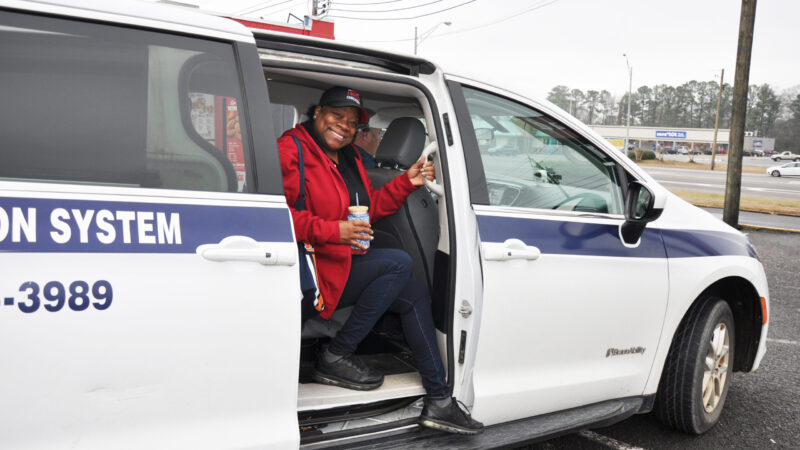Northern Beltline: Overview
$90 million per mile. That’s the latest price tag for the proposed Northern Beltline around Birmingham. Proponents say it will spur economic development in the northern part of the county. Opponents say it’s a price tag they can’t afford for a road they don’t need. This week, WBHM examines the Northern Beltline proposal. We start with an overview from Tanya Ott.
The Northern Beltline would stretch from Bessemer in the southwest, up through the northern part of the county, then connect down in the east with I-59 in Trussville. Think of it as the northern half of I-459. Plans have been in the works for decades.
“This issue, I point out, has been percolating for longer than I’ve been alive!” laughs Renee Carter. As executive director of the Coalition for Regional Transportation she’s head cheerleader for the effort to build the Northern Beltline.
“During the construction phase alone, construction of the Northern beltline will have a $7 billion economic impact on this area. It’ll create nearly 70,000 jobs.”
Those projections come from the Center for Business and Economic Research at the University of Alabama. Carter’s group commissioned the center to do a study on the Beltline. It found that during the construction phase alone, the Beltline would generate about $155 million in new income, sales and property taxes.
“I don’t know any city, county, state in this country that wouldn’t love to have that kind of vast in-flow of new tax dollars as they try to provide essential services.”
The study also suggests the Beltline would improve access to jobs for low income residents. But not everyone’s as optimistic.
“We’re just overall concerned with the ballooning cost of this project,”
says Gil Rogers. He’s an attorney with the Southern Environmental Law Center, which is suing the Alabama Department of Transportation to slow down the project.
ALDOT pegs the cost of the Beltline at $3 billion. But the Federal Highway Administration’s latest estimate is significantly higher: $4.7 billion. Eighty percent of the money would come from federal dollars earmarked for Appalachian interstate construction. The remainder ($940 million) would come from the State. And Rogers says Alabama can’t afford it.
“The state component of that money alone is basically ALDOT’s entire construction budget for the entire state so it’s a huge investment, especially when you’re looking at state and federal budgets and local government budgets being so cash-strapped.”
And it’s not just the cost. While proponents say the Beltline will improve traffic safety and travel times, critics argue the Beltline won’t relieve traffic congestion. They cite a report from the Birmingham Metropolitan Planning Organization that finds the Beltline would reduce the traffic load between 20-59 and I-65 in downtown Birmingham by just 1% – 3%.
Gil Rogers of the Southern Environmental Law Center would like the state to consider other alternatives.
“You could look at a different design, different routing of the road, a parkway instead of a 6 lane interstate. If you’ve ever been up in the Washington DC area there are a bunch of parkways up there. They’re much more pleasant to drive down while still serving that economic development purpose.”
Rogers suggests spending the money to upgrade bridges and roads that are already falling apart. Or maybe transit.
“I’m talking about things like buses, potentially trolleys in parts of the Birmingham area.”
All important things, says Renee Carter of the Coalition for Regional Transportation, but not things you can do with the federal money, which she says is only usable to build an interstate. Not a parkway, not mass transit.
After decades of planning, there’s been a recent urgency to get the project underway. Carter says if the state doesn’t start soon, it risks losing the money.
“It expires when we’re not paying attention and we let one of the other 12 states who qualify for this funding take it away from us. And they would very much like to because for 40 years these tax dollars that Alabamians have been paying in, have been spent primarily in those 12 other states.”
Earlier this year the Alabama Department of Transportation indicated it could issue contracts on the Beltline as soon as the end of 2011. But a new legal challenge could delay that process. We’ll have more on that, tomorrow in our series.
Kalshi reveals insider trading case against editor for MrBeast
With prediction markets booming, so have concerns about insider trading. Now, Kalshi has disclosed its first public actions against accounts suspected of trading on confidential information.
Greetings from Jordan’s Wadi Rum desert, where patches of green emerge after winter rains
Wadi Rum's otherworldly landscape is where Star Wars movies and The Martian were filmed. In late winter, plants emerge in this desert — but some are toxic to camels, so their herders must protect them.
Lack of transportation keeps many Alabamians from working. Rural public transit programs are trying to help
While lack of transportation is a major employment barrier in Alabama, few people take public transit to work. That dynamic is even more pronounced in rural areas.
When a horse whinnies, there’s more than meets the ear
A new study finds that horse whinnies are made of both a high and a low frequency, generated by different parts of the vocal tract. The two-tone sound may help horses convey more complex information.
Hundreds of American nurses choose Canada over the U.S. under Trump
More than 1,000 American nurses have successfully applied for licensure in British Columbia since April, a massive increase over prior years.
Trump’s many tariff tools mean consumer prices won’t go down, analysts say
The Supreme Court struck down President Trump's signature tariffs. But the president has other tariff tools, and consumers shouldn't expect cheaper prices anytime soon, economists say.






